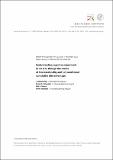Understanding cognitive impairment in the U.S. through the lenses of intersectionality and (un)conditional cumulative (dis)advantage
Abstract
Grounded in theories of intersectionality and cumulative (dis)advantage, we develop complementary formalizations of (dis)advantage to study disparities in cognitive impairment: Conditional Cumulative (Dis)Advantage that reflects inequalities in outcomes and Unconditional Cumulative (Dis)Advantage that additionally accounts for inequalities in opportunities. We study the properties of these formalizations and show that cumulative disadvantage does not imply cumulative advantage. Using these formalizations and incidence-based multistate models, we analyze the Health and Retirement Study to assess how racial/ethnic, nativity, gender, early-life adversity, and educational (dis)advantages accumulate into three important metrics for characterizing later-life cognitive impairment—lifetime risk, mean age at first impairment, and cognitive health expectancies. We find that the benefits and penalties of one (dis)advantage depend on positionality on the other axes of inequality. Black women and Latinas experience Conditional Cumulative Disadvantage in cognitive impairment: they are penalized more from having lower education than Whites. White men experience Conditional Cumulative Advantage: they benefit more from higher education than Blacks or Latinx. However, when accounting for racial/ethnic inequities in educational opportunities, results ubiquitously show Unconditional Cumulative Disadvantage. Our formalization provides a mathematical grounding for cumulative (dis)advantage, and the empirical results comprehensively document the multi-dimensional, intersecting axes of stratification that perpetuate inequities in cognitive impairment.
Citation
Hale , J M , Schneider , D C , Mehta , N K & Myrskylä , M 2022 ' Understanding cognitive impairment in the U.S. through the lenses of intersectionality and (un)conditional cumulative (dis)advantage ' MPIDR working paper , no. 2022-029 , Max Planck Institute for Demographic Research , Rostock , pp. 1-83 . https://doi.org/10.4054/MPIDR-WP-2022-029
Publication
Type
Working or discussion paper
Description
Funding: NKM was supported by the National Institute on Aging P30AG066582.Collections
Items in the St Andrews Research Repository are protected by copyright, with all rights reserved, unless otherwise indicated.

